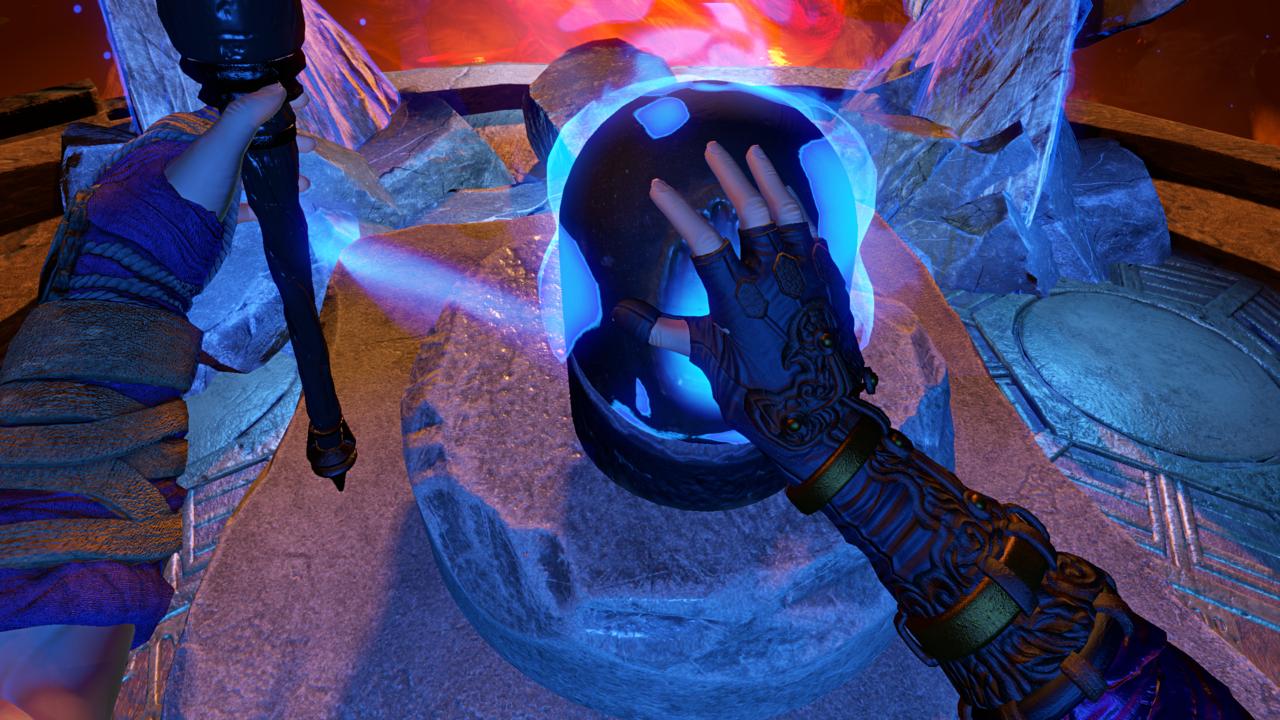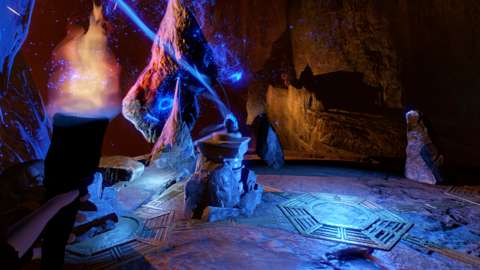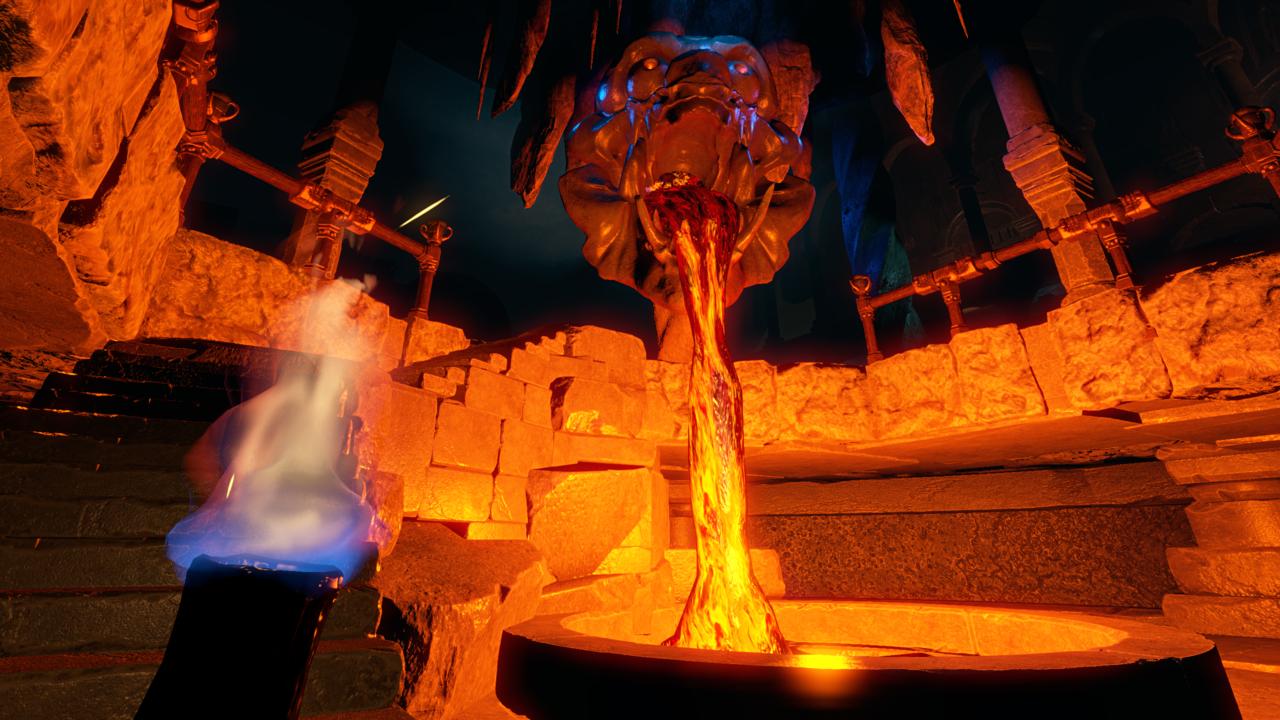Paul Neurath is one of those dimly familiar yet somehow elusive names that, in a just and righteous world, would be inscribed in fine gold lettering on the back of every single game box. As the founder and company-wide Creative Director of the legendary--though now defunct--development house Looking Glass Studios, Neurath helped pioneer design techniques and gameplay mechanics that still inform many of our favorite games to this day. The studio produced classics like the original Thief and System Shock 2 and fostered influential talent like Deus Ex creator Warren Spector, BioShock mastermind Ken Levine, and Rock Band overseer Greg Lopiccolo.
Their Ultima Underworld games in particular provided some of the earliest examples of what we now call "emergent gameplay," as well as the choice-and-consequences narrative structure that defines games like Deus Ex: Mankind Divided and Fallout 4. Now, after 23 years away from the series, Neurath has assembled a new team at OtherSide Entertainment to revive Underworld's systemic, open-ended gameplay in first-person fantasy RPG Underworld Ascendant, which is due out in late 2016. Along with Design Director Joe Fielder, Neurath recently stopped by GameSpot's offices to demo the game and answer questions about Looking Glass's legacy.
DOOM: The Dark Ages | Gameplay Sizzle Trailer NINJA GAIDEN 2 Black Official Launch Trailer NINJA GAIDEN 4 Official Announce Trailer Assassin's Creed Shadows Hands-On Preview Assassin's Creed Shadows: Story Trailer Assassin's Creed Animus Hub - Explanatory Overview Trailer Black Ops 6 - Season 02 Cinematic Trailer Pokémon TCG Pocket: Space-Time Smackdown | Coming Soon! FINAL FANTASY VII REBIRTH - PC Launch Trailer over the hill - Announcement Trailer PAYDAY 3: Don't Be a Hero Trailer Vampires: Bloodlord Rising | Dragos Gameplay Trailer
Please enter your date of birth to view this video
By clicking 'enter', you agree to GameSpot's
Terms of Use and Privacy Policy
GameSpot: So just broadly speaking, tell us a little about the demo we just saw.
Paul Neurath: We're highlighting a particular encounter with a particular character where the creature physically overmatches them. They would never stand a chance in a hand-to-hand fight, so instead they have to use their wits. That's sort of leveraging the improvisation engine we have that allows the players to kind of come up with clever solutions using the environment and things around them.
Joe Fielder: It's kind of the suite of technologies that we're using to give the player a ton of choices on how to solve a particular challenge. Basically, we'll present you with challenges, and how you solve [them] is up to you.
Neurath: This is kind of a peek at what we're calling our strategic ecology. We want to make it so that you can really quickly understand the creature's strengths and weaknesses and wants so you can formulate strategies around it. The game is constantly giving you tangible gameplay, even our supplemental narrative will have hints at things to do, better ways to play the game. We'll always be kind of teaching how to play the game.
Is every situation going to have an elaborate, contextual solution like the lava we saw in the demo?
Neurath: We're designing those spaces with dynamics and things you can, what we call "frob." In this case, we're showing some lava flow going through, but in the actual game, we would have multiple things going on. You might also have other fluids, a subterranean stream that you could dam up or redirect. There could be a landslide that you could start. There could be a creature that you could charm and [have] fight on your side, if you had some magical skills.
In the original Thief, one of the things that was very important to that game was, we allowed you to manipulate the environment. If you had some corridor you had to traverse that was patrolled and it started with a set of torches, you could use a water arrow to create a corner of shadow that you could then take advantage of. That's a very important step, because the player is now looking around the environment and saying, "What can I change in this environment to give myself an edge and an advantage?"

Fielder: We'll also allow the player to fail. It may be that, "There's a finite amount [of lava], and I'm using it to try to open up a door, and I've accidentally diverted it to the wrong place and now it's gone. I can't go in there now." Other than say like Dark Souls, I can't think of too many games that have done that.
Neurath: There have to be consequences. You have player choices; the choices have to matter. I think that's the unique power of games, as opposed to a film or a book. That's the lens we look through: "Does this empower the player to craft their own experience?"
Fielder: We're not going to create a super-high difficulty curve. There's often many solutions, and so [with] trial and error, at least, you'll probably get there.
Neurath: If you slam one door in your own face on accident, there's potentially another one around the corner, if you just look for it.
Can you tell us a little more about how the moment-to-moment gameplay will feel?
Neurath: The original Underworld still had one leg back in traditional pen-and-paper gaming, so it's still dice roles for strength and dexterity, all that stuff. We're jettisoning all of that. There's numbers crunched in the back, but the player doesn't experience it. We want it to feel like an authentic experience. If you were really this character, really in a fantasy world, you're not thinking about, "I have a 17 strength." You're thinking "I'm learning a skill, I'm getting better and better at wielding a sword" or "I've learned now how to cast some more spells."
Fielder: We don't really have hardcore classes, per se. We have skills and abilities that fall into combat, stealth, and magic. If you want to just focus on one of those areas, you could. You would have a very, very different experience. For magic, I'm referring to it as you're kind of unlocking the source code of reality. We have a runic spell system, similar to the original Ultima Underworld's, but we're doing a procedural spell system that our lead designer, Tim Stellmach, has developed. It really allows you to kind of customize your own favorite spells. He was the lead designer on Thief, and he worked on Ultima Underworld II as well.
On top of that, we have our faction system, which is there are three main factions who aren't openingly warring, yet they're definitely at odds. All three factions have their own wants and desires that are very much on a collision course. Based on who you decide to ally with, you are unlocking different quests. You're unlocking different narrative, different endings, potentially, and also access to exclusive weapons and rooms. Really, it's very much a player-directed experience.
The original Underworld still had one leg back in traditional pen-and-paper gaming, so it's still dice roles for strength and dexterity, all that stuff. We're jettisoning all of that.
Neurath: Your approach to many of these encounters can come out very differently depending on your character or the strategy that you decide to take. Replayability is something we really want to go for here. We're a mini-studio. We only have six people in-house, and so we're not going to build some massive game that has 500 hours' worth of linear content. Instead, we can create a game that's very dynamic, and every player who plays it can have a different sort of experience.
One of the things I thought was really significant and interesting about the demo is that your character talks. That's a big design choice.
Neurath: That's the one element of this which is in some sense misleading. In the actual game, your character's not going to talk because we want you to roleplay it. It's you as a character, so we don't want to voice you. [The character in the demo is] an NPC who you will probably encounter, but we wanted to explain what the player was thinking in the video.
Fielder: There will be a substantial narrative, but it won't necessarily manifest the way that we just saw.
Neurath: This is a game that will not have cut scenes. We'll have narrative that will be kind of bread-crumbed throughout, a lot like a lot of the early Looking Glass games, a lot like the original Ultima Underworld and System Shock and in Thief, and the BioShock games as well.

So your character is a human who's been transported into this realm, is that correct?
Neurath: Yes, it's a sequel. We're taking the same trope where you're the avatar. You come from Earth, from today. You are you, in essence, and you go through a rune gate and find yourself in the Stygian abyss. [In the] early stages, you're just trying to survive and get a lay of the land.
I suppose that's going to make players feel a little isolated, as you're very much an alien in this world. You're, I assume, the only human.
Neurath: No, there would be other humans. This rune gate connects Earth and the Stygian abyss. It also connects Shroud of the Avatar [and] New Britannia as well, and potentially other worlds. The dark elves are a band that left New Britannia a couple generations ago to come into the Stygian abyss. You're not the only one who's been a stranger to this experience.
Fielder: It's pretty neat to have narrative hooks into one of [Ultima creator] Richard Garriott's projects. Obviously, Ultima Underworld tied in with Ultima as well. Our dark elves come from New Britannia.
Neurath: Yeah, Tracy Hickman--New York Time's best-selling fantasy author, he did some of the Dragonlance stuff…
Fielder: Yeah, he's doing a novel for us, based on the story of the dark elves coming from New Britannia, and kind of the start of that society.
So you're really embracing and leveraging the Ultima lore, then. This is truly an experience for Ultima fans.
Neurath: To clarify, we don't have the Ultima brand. They didn't want to release it to us. We have everything else, though. We have all the characters and setting and narratives from the original Underworlds. For the fans, it's fun continuing that connection.
To clarify, we don't have the Ultima brand. They didn't want to release it to us. We have everything else, though.
Fielder: You can play Underworld Ascendant and enjoy the story entirely without having played the early games, but if you have, we have narrative hooks that are tied into both Ultima Underworld 1 and Ultima Underworld 2.
Neurath: So fortunately the use of the Ultima brand doesn't really impact anything fictionally, because we didn't really use Ultima as a brand in the game.
What would you say to someone who isn't familiar with Ultima or Underworld, who doesn't know your game from Skyrim? What sets your project apart, and what will entice those new players to come give your game a shot?
Neurath: There's a similarity I'll draw with Minecraft. People play Minecraft because it really empowers them to play in the sandbox the way they want. I think there's a similarity there, that there's sort of an empowerment to play the game the way you want to play it, which is not really so much the case with these other fantasy games. They're more a, "We're presenting you the desire to come up with a path, a quest that you have to solve." It's a very different experience.

It sounds like it's not going to be a completely linear experience, but it's also not set in a massive open world. Can you talk about the way the game is structured, and about how players will experience the story?
Fielder: There is an arc to the story. It's funny because we do talk about it's sort of an open world, but it's a very comparably small open world. It's a very intimate space, so it's not an open world in terms of a Skyrim. This is a much more tightly-knit, inter-knit, but much more crafted experience.
Two games that pop into my mind that I think might use a similar structure are Deus Ex and Dishonored. Sort of open but dense…
Neurath: Both of those developers came out of Looking Glass. I did some design work for the Arcane guys, and Harvey Smith was a playtester on Ultima Underworld. That's where he started his career.
Any final thoughts?
Neurath: We've been planning to do Underworld 3 since 1993, and this is finally, all these years later, our chance to do it. We're going to really push, and try to set a new high bar for the category.

